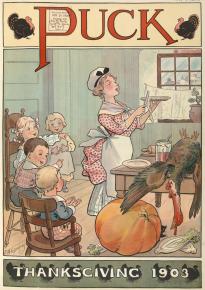Classroom and Parent Resources for Thanksgiving
Posted by Gilder Lehrman Staff on Thursday, 11/17/2022
 The Plymouth colonists and the Wampanoags shared an autumn harvest feast in 1621 that served as the basis for what we now celebrate as Thanksgiving. Though it continued to be celebrated, first across the colonies and then the United States, it was not until 1863 that President Abraham Lincoln proclaimed Thanksgiving Day a national holiday.
The Plymouth colonists and the Wampanoags shared an autumn harvest feast in 1621 that served as the basis for what we now celebrate as Thanksgiving. Though it continued to be celebrated, first across the colonies and then the United States, it was not until 1863 that President Abraham Lincoln proclaimed Thanksgiving Day a national holiday.
Explore the origins of Thanksgiving, from its earliest inception through its evolution into a recognized federal holiday on the last Thursday of November, with the Gilder Lehrman Institute!
Spotlight and Video on the Thanksgiving Proclamation
- “Thanksgiving Proclamation, 1863”: Abraham Lincoln issued this proclamation encouraging Americans to observe the last Thursday in November as a Day of Thanksgiving. Explore the document and its history through a special episode of Inside the Vault, the text of the document itself, and questions for discussion.
Video
- “Thanksgiving: Another Serving” by Jill Lepore: Harvard professor and New Yorker staff writer Jill Lepore describes how, within a single generation, relations between the settlers and the Wampanoags declined from the fabled First Thanksgiving to a devastating war in this video:
Lesson Plan
- “Pilgrims, the Mayflower Compact, and Thanksgiving”: Elementary school teachers and parents will find this lesson, which includes art projects and creative and fun analysis of primary and secondary sources on the voyage of the Pilgrims to America aboard the Mayflower, the writing of the Mayflower Compact, and the origin of Thanksgiving, particularly useful.
History Now Essay
- “A History of the Thanksgiving Holiday” by Catherine Clinton, History Now 4: American National Holidays (Summer 2005): An essay on the origins of this quintessentially American tradition and how and when the observance become an official part of our national identity and holiday calendar
Recognizing and celebrating historical holidays—from memorializations of monumental American figures such as Martin Luther King Jr. to remembrances of events like Juneteenth—offer entry points for a deeper exploration of the pivotal moments, key figures, and central conflicts in American history. The Gilder Lehrman Institute offers American historical holiday resources from its Collection of more than 85,000 primary source documents, essays published in its online journal History Now, videos of talks by eminent scholars, lesson plans by American history teachers, and more to help guide discussions, create projects, and gain content knowledge.